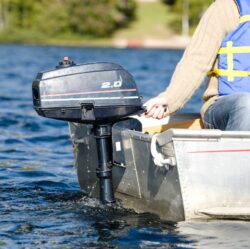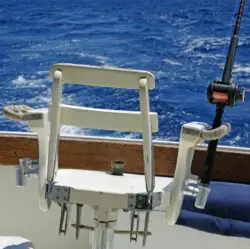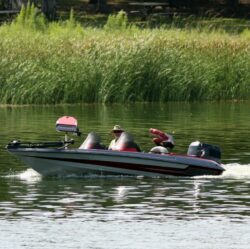Imagine you’ve been gently swept off your feet, not by a smooth-talking lothario but by the thrilling embrace of a Bass Tracker Boat, gliding like a hawk on a thermal current. Believe it or not, this isn’t an ill-conceived attempt at a pickup line at a marina.
*This post may contain affiliate links. As an Amazon Associate we earn from qualifying purchases.
Instead, it’s a picture of the passion and respect that countless outdoor enthusiasts have for Bass Tracker boats. These majestic vessels, with their polished lines and gleaming hulls, are more than mere boats—they are a promise of fun-filled days of casting lines and reeling in big catches.
They’re a testament to the art of crafting fine watercraft, combining form and function with a dash of pure outdoor joy.
But can you get a Bass Tracker that is made of fiberglass? Is that even an option for this boat brand?
Bass Trackers are currently only made from aluminum. Bass Tracker DOES NOT make fiberglass boats. Some of the accessories, dash panels, etc. might have fiberglass in them but Bass Tracker only uses aluminum hulls for their boats.
With roots running back to the late 1970s, Bass Tracker—aptly christened the “Fishin’ Barge”—has become an enduring symbol of quality and value in the boating community. An undisputed heavyweight in the field of fishing boats, Bass Tracker has been serving up premium aluminum fishing boats with a side of smiles for decades.
Picture the giddy excitement of my little one, Mia, reeling in her first catch from a Bass Tracker boat, or the laughter-filled adventures of young Jonathan and Clara as they explore the vast expanse of a lake. Those are the heartwarming moments these boats provide.
Understanding Different Boat Materials: Aluminum vs Fiberglass
Before we dive into the pressing question, let’s lay some groundwork. Much like pizza crust preferences, boat material selection tends to stir up some hearty debates among boat enthusiasts.
After all, the question of aluminum versus fiberglass is a classic sea-faring tango danced by many, but mastered by few. It’s a dance my 12-year-old, Mia, does with her ballet shoes, but with less pirouetting and more talk of tensile strength and resistance to corrosion.
Aluminum, the celebrity material of Bass Tracker boats, shines bright in its lightweight nature, robust strength, and easy-to-repair properties. Picture it as the affable hero of a feel-good movie, admired for its dependability, resilience, and everyman charm.
You’ll always catch it holding its own against scrapes and scratches, shrugging them off like a seasoned action star.
Fiberglass, on the other hand, struts into the arena like a high-fashion model—it’s sleek, smooth, and aesthetically impressive. Moreover, it boasts superior moldability, allowing for a broader range of boat designs.
I remember when Jonathan, our 8-year-old aspiring artist, spent a whole weekend molding clay figures. It’s kinda like that, but with less mess and more structural integrity.
Now, while fiberglass might seem more high maintenance than aluminum (much like a diva on a catwalk), it holds up pretty well against the harsh marine environment. Plus, it offers a smoother ride in rough waters compared to its aluminum counterpart.
And let’s not forget the unsung advantage of sound absorption— fiberglass dampens the noise of water slapping against the hull, making for a quieter, more peaceful ride.
That’s enough of a crash course. Now, let’s sail towards the heart of the matter: Does Bass Tracker make a fiberglass boat?
I’ll get to that in a moment. But before we do, take a moment to revel in the suspense. It’s like the feeling you get when you’ve got a big one on the line—you’re not sure if it’s a trophy bass or an old boot, but the anticipation makes your heart race.
Does Bass Tracker Make a Fiberglass Boat: Unveiling the Truth
So, does Bass Tracker dance the fiberglass tango? The answer, my aquatic amigos, is no. Bass Tracker has remained faithful to their aluminum roots, never having dallied in fiberglass manufacturing.
Why, you might ask? Let’s dive into that:
- Heritage: Bass Tracker’s heritage is steeped in aluminum. It’s like a secret family recipe, passed down through generations. Changing it would be like turning grandma’s secret apple pie into a pineapple upside-down cake. Some things are just not done!
- Craftsmanship: Working with aluminum has allowed Bass Tracker to refine their craftsmanship over the years, much like my little Clara has honed her ability to create highly detailed Lego masterpieces.
- Quality and Value: Aluminum provides a high-quality, affordable solution for boat enthusiasts. It’s the grilled cheese sandwich of the boating world—simple, reliable, and always hits the spot!
Bass Tracker’s Devotion to Aluminum Boats
Bass Tracker’s dedication to aluminum is akin to a dog’s loyalty to its human—it’s unwavering and enduring. Why this level of fidelity, you ask? Well, let’s break it down:
- Resilience: Aluminum boats, as sturdy as an old oak tree, are designed to resist corrosion and withstand the elements. This resilience is particularly important for fishing boats, which often take a beating from the elements, much like my fishing hat that has survived rain, wind, and countless bad hair days.
- Lightweight: These boats are lighter than their fiberglass counterparts, making them easier to handle and tow. Imagine wrestling a full-grown bear (that’s fiberglass) versus an enthusiastic puppy (that’s aluminum). Which would you rather take for a ride?
- Easy to Repair: Aluminum boats have the durability of a superhero. But even superheroes have their kryptonite, and when damage does happen, aluminum is much easier to repair than fiberglass. It’s like fixing a flat bicycle tire versus a car tire – both are doable, but one is definitely less of a headache.
Why Would Consumers Want Fiberglass Bass Tracker Boats?
Now, it’s not all sunsets and roses in the world of aluminum. Fiberglass boasts some luring advantages that might cause some boat enthusiasts to cast longing looks its way. Here’s why:
- Smooth Ride: Fiberglass boats offer a smoother ride in choppy water, sort of like riding in a luxury sedan compared to a rugged off-road vehicle.
- Quiet Operation: They are quieter, making for more peaceful fishing trips. It’s like choosing a library over a bustling coffee shop for some peace and quiet.
- Aesthetic Appeal: Let’s face it, fiberglass boats have a certain glamour to them. They are the marine equivalent of a high-end sports car—sleek, shiny, and undeniably eye-catching.
Alternatives to Fiberglass Bass Tracker Boats
If you’re pining for a fiberglass fishing boat, fear not! While Bass Tracker might not cater to your fiberglass fancy, there are other fish in the sea! Check out these alternatives:
| Manufacturer | Model | Notable Feature |
|---|---|---|
| Boston Whaler | 210 Dauntless | Renowned for its unsinkability |
| Grady-White | Fisherman 257 | Known for its excellent ride quality |
| Sea Ray | SPX 210 OB | Popular for its luxury features |
Each of these vessels has its own unique selling points, much like each of my kids brings their own unique charm to our boating adventures.
For Mia, it’s her uncanny ability to catch fish when no one else can. For Jonathan, it’s his endless excitement and energy. And for Clara, it’s her childlike wonder at everything from the biggest fish to the smallest water bug.
Whether you’re seeking the smooth ride of a fiberglass boat or the resilient strength of an aluminum one, remember, the real joy lies in the journey and the memories you create on the water. Until next time, keep those lines tight and your spirits high!
Key Features of Bass Tracker Boats
Bass Tracker boats come chock-full of features that would make any angler giddy with delight. They’re like a Swiss Army knife for fishing—packed with useful tools, each designed with a purpose in mind.
Let’s cast a net over some of these key features:
- Aluminum Construction: At the heart of every Bass Tracker boat is its aluminum construction. It’s like the secret sauce in grandma’s famous casserole—it binds everything together and gives it that extra oomph.
- Versatile Seating: Bass Tracker boats offer versatile seating arrangements, which means everyone in the family can find their favorite spot. I’ll often find Clara up at the bow, Mia at the stern, and Jonathan? Well, he’s usually trying to convince me to let him drive.
- Livewells: These boats come equipped with aerated livewells to keep your catch fresh. It’s like having a refrigerator on board but for fish.
- Rod Storage: Bass Tracker understands that a fisher’s rods are as precious as a knight’s swords. Therefore, ample rod storage is provided, keeping your beloved fishing gear safe and secure.
- Fish Finders: Many models come equipped with top-of-the-line fish finders. It’s like having a treasure map where X marks the spot, but instead of treasure, it’s fish.
Future Possibilities: Could Bass Tracker Ever Make Fiberglass Boats?
As much as I’d love to gaze into a crystal ball and divine the future of Bass Tracker, it seems the company’s devotion to aluminum is as unwavering as a lighthouse in a storm.
However, in the ever-evolving world of boating, who can truly predict what’s on the horizon? It’s like trying to guess what plot twist Clara will add to her next bedtime story—always surprising and often featuring unicorns.
Still, if Bass Tracker were to consider making fiberglass boats, they could potentially leverage the following:
- Brand Reputation: Bass Tracker’s established reputation would provide a solid foundation for launching a new product line, much like a well-loved author venturing into a new genre.
- Customer Base: They could offer their existing customers more choices, which is always a good thing, right? After all, variety is the spice of life!
- Market Expansion: It could open up new segments of the market, like those customers who prefer the features of fiberglass.
In any case, while the company has not made any announcements about venturing into fiberglass, the potential advantages make it an intriguing speculation.
Maintaining Your Bass Tracker Boat: Aluminum or Fiberglass
No matter whether you’re sailing on aluminum or fiberglass, taking care of your boat is as essential as putting sunscreen on a sunny day. Here’s a handy list of maintenance tips for both:
Aluminum Boat Maintenance Tips:
- Regularly check for corrosion.
- Clean the hull with soapy water, rinse thoroughly, and dry.
- Apply a protective coat of wax for added protection.
- Inspect and replace the anodes if necessary.
Fiberglass Boat Maintenance Tips:
- Regularly check the gel coat for cracks.
- Clean the hull with a non-abrasive cleaner and rinse thoroughly.
- Wax the hull to maintain the gel coat.
- Inspect and repair any blistering in the hull.
Remember, good maintenance is like eating your vegetables—it might not always be fun, but it’s essential for long-term health. Whether your boat is made of aluminum or fiberglass, keep it clean, keep it safe, and it’ll provide you with years of aquatic adventures.
And isn’t that what boating is all about?
Exploring Popular Models of Bass Tracker Boats
Diving into the portfolio of Bass Tracker’s aluminum creations is like opening a box of assorted chocolates—you’re greeted with a delightful range of options, each with its unique appeal. Let’s take a tour:
Bass Tracker Classic XL
Ah, the Classic XL, it’s like the comfort food of Bass Tracker’s lineup—a reliable, feel-good choice. It’s compact, yet spacious enough for a family fishing trip.
Just like that time when Mia managed to land a bass larger than Jonathan’s, leading to an endless bragging rights competition.
- Size: At 16′ 8″, it’s cozy yet spacious, much like our family’s favorite picnic spot.
- Capacity: It can accommodate up to 4 people. That’s perfect for me and my three junior adventurers.
- Features: With features like a Minn Kota® trolling motor, Lowrance® fishfinder, and a custom-matched trailer, it’s all geared up for a great day on the water.
Bass Tracker Pro Team 175 TXW
If the Classic XL is a comfort food, the Pro Team 175 TXW is like a gourmet meal—it’s got a little bit of everything, served up with style. It’s a hit with hardcore anglers, like my buddy Bob, who claims he “couldn’t fish without it.”
- Size: Measuring 17′ 7″, it offers ample space without being too bulky, kind of like a well-fitted life jacket.
- Capacity: It seats up to 4 people comfortably. Remember, fishing should never feel like a rush-hour commute!
- Features: It comes with a boatload (pun intended) of features, including a 21-gallon aerated, divided livewell, versatile seating, and multiple storage compartments.
Bass Tracker Boats: The Value Proposition
Bass Tracker boats are not just boats; they’re a value proposition. And no, I’m not talking Wall Street jargon here.
What I mean is, these boats deliver fantastic value for the money, like finding a designer dress at a thrift store.
- Quality: The build quality is sturdy and reliable, like a well-made fishing rod.
- Performance: These boats offer exceptional performance—imagine an Olympic athlete, but it’s a boat.
- Affordability: With a price range that suits different budgets, they’re as affordable as a family meal at your favorite diner.
Final Thoughts: Fiberglass vs. Aluminum Debate
Answering the title question, “Does Bass Tracker make a fiberglass boat?”, the response is: No, as of right now, Bass Tracker does not manufacture fiberglass boats. They are known for their top-quality aluminum boats.
Let’s proceed to compare the aluminum boats from Bass Tracker with potential fiberglass alternatives. This comparison can help consumers understand which choice better suits their needs:
| Feature | Bass Tracker Aluminum Boats | Potential Fiberglass Boats |
|---|---|---|
| Construction Material | Aluminum | Fiberglass |
| Weight | Generally lighter, easier to tow, and use less fuel. | Heavier, which could affect towing and fuel consumption but generally handle waves better due to the weight. |
| Durability | Known for their durability and resistance to rust. | Fiberglass boats are tough and resistant to water absorption. |
| Maintenance | Requires less maintenance; however, possible corrosion needs attention. | Requires more maintenance, especially for the gel coat, but doesn’t suffer from corrosion. |
| Cost | More affordable and offer excellent value for money. | Typically more expensive than aluminum boats. |
| Performance | Aluminum boats are nimble and easy to handle. | Fiberglass boats generally provide a smoother ride in choppy conditions. |
| Ideal For | Perfect for inland water bodies, calm waters, and are excellent for freshwater fishing. | Ideal for offshore, larger water bodies, and rougher sea conditions. |
Remember, the best choice between aluminum and fiberglass largely depends on your specific needs, preferences, and the type of waters you’ll be navigating.
It’s like choosing between a home-cooked meal and a five-star restaurant; both have their places, and the best one depends on your mood (and perhaps your wallet).









